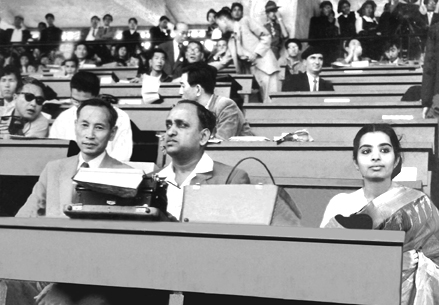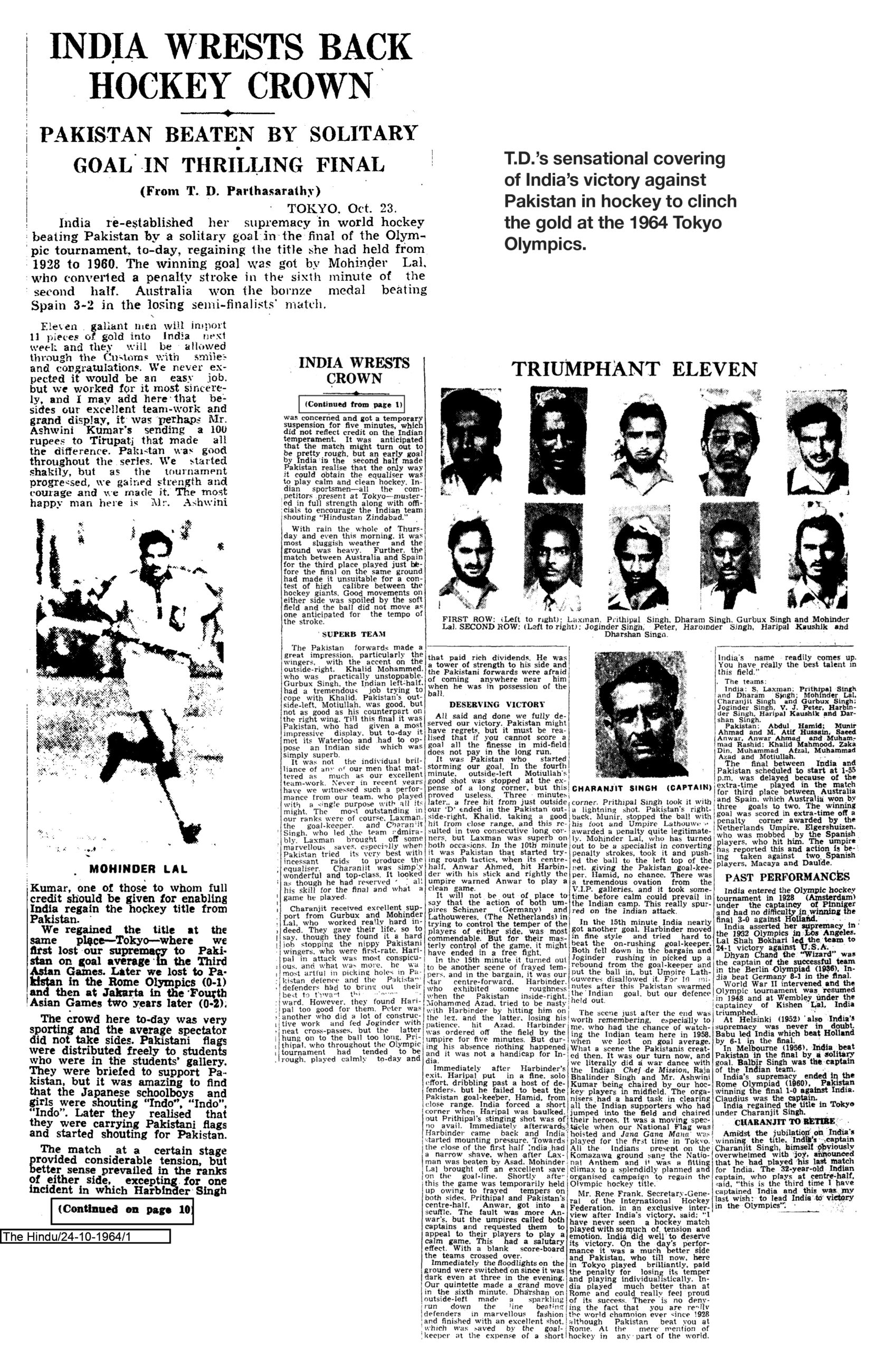Registered with the Registrar of Newspapers for India under R.N.I 53640/91
Vol. XXX No. 13, November 1-15, 2020
From Jesse Owens to Sir Gary Sobers – he reported National and International events in his style
by Deeptha Vivekanand
(Continued from last fortnight)
In 1960, when T.D. Parthasarathy went to Rome to cover the Olympics, American broad jumper Ralph Boston, was expected to break Jesse Owens’s decade-long record.
In his interview with Owens dated December 10, 1960 for Sport & Pastime (S&P), which he was also writing for, T.D., notes, “…with the legendary figure of Jesse Owens himself present to watch the race I was anxious to record the on-the-spot reaction of Jesse when his record was actually broken by Boston. He was then sitting near the finish line of the track, because that was the best spot from where one could also get an excellent view of the broad jump. I straightway rushed to Jesse and requested him to speak a few lines.” This interview became one of the weekly’s most admired pieces. He also interviewed Boston later whom he had predicted would win the gold.
 At the Press Centre, Tokyo Olympics 1964.
At the Press Centre, Tokyo Olympics 1964.When pressmen were not allowed to enter the training ground to enable athletes to train undisturbed, T.D., managed to find a way to get a story. During the Rome Olympics, with the help of the Russian Head Coach Kharabov, he travelled with the athletes in their truck in order to interview their decathlon man Kuznetsov.
T.D. was a popular figure with young Indian athletes and officials too. Not everyone could converse comfortably in English and sort out the confusions and so T.D. would help them out by liaising with the Olympic Games Committee. This made him close to many of them, including Milkha Singh, whose career was propped up by T.D.P’s writings in S&P. Even today, Milkha remembers him fondly and with gratitude.
T.D. wrote in support of athletes and called for reform in the way the IOA functioned. He garnered everyone’s respect through his impassioned pleas for better training facilities for Indian athletes. In an article titled The Tribe of Sportscribes in the October 2000 issue of Madras Musings, K. Sundarajan, former Sports Editor of The Hindu writes, “The highest dignitary in the sports echelons did not overawe him. He even put Raja Bhalinder Singh in his place at a meeting of the IOA.”
For a Triplicane Brahmin like T.D., travelling abroad was not without its inconveniences, food being the biggest snag. But the self-reliant man that he was, he would pick up yogurt and cooked rice from the Olympic village to make his thayir sadam, and have it with the various podis his wife would pack for him. That was his only fuel. No alcohol, no tea, no coffee or cigarettes to get the words flowing.
T.D., wrote an almost full-page report celebrating India’s victory against Pakistan in hockey to clinch the gold at the 1964 Tokyo Olympics. His love for hockey was evident in the opening lines: “eleven gallant men will import 11 pieces of gold into India next week and they will be allowed through the Customs with smiles and congratulations.” The report went on to give a blow-by-blow account of the match, making it come alive for the reader as if they were watching it from the stands. T.D., and other sports journalists of yore had to typewrite their stories and scramble to file them well ahead of time, to be able to take it to the readers of the morning edition. Imagine the speed and accuracy with which they had to finish their work. The deadline was usually one hour after the game ended and before the copy was due at the desk for editing. Not only was T.D. filing daily reports, he was also planning and writing weekly features for S&P during his travels.
Although he never wrote about cricket, his ability to hobnob with the greats of the game gave him the opportunity to get exclusive pictures and interviews for S&P. Ray Lindwall rode pillion on his motorcycle for a photo shoot! When the West Indies came to Madras in 1959, T.D. managed to get up-close and personal with Sir Gary Sobers and Lance Gibbs. He rubbed shoulders with the likes of Vijay Hazare, Hanif Mohammed and Clyde Walcott. All this, in an effort to get only the very best stories for S&P and The Hindu.

T.D.’s enterprise in putting together many such features and bringing in several contributory sports writers from abroad to write for S&P, prompted the management to ask him to concentrate more on the entire process of the production of the weekly journal. However, in 1968, T.D. left S&P in a huff following a disagreement with the top brass. “He was the soul and spirit of the weekly,” says K. Sundarajan, in the Madras Musings article mentioned earlier. Shortly after, S&P had to shut down. The very same year T.D. joined Deccan Herald as a contributing correspondent.
In 1972, when it was time for the Munich Olympics, there were no publications to fund his travel and stay but they were willing to mandate him to write for them. That could not stop the insuppressible writer in search of his stories. T.D. undertook the trip on his own. He took a train from Madras to Delhi, flew from there to Kabul, rode a bus to Istanbul from where he got on the Orient Express to reach Munich. He ended up reaching Munich a whole week ahead of the Games with no place to stay. But, no worries! He managed to befriend some local Germans and stayed in their homes till the Games Village opened. His capacity to network and forge friendships opened doors for him wherever he went.
In Munich, T.D. would go on to interview ace-swimmer Mark Spitz, who had won seven golds, moments before he was whisked away to the U.S. in light of the Black September attacks, which he witnessed live from the Games Village. This interview however, remained unpublished and the tapes were with him for a long time. When Des Pardes, a weekly Punjabi newspaper based in Britain and Europe learnt that T.D. was in Munich, they requested him to write a few articles on Indian hockey. These articles were then translated into Punjabi and published. Such was T.D.’s following.
T.D. did not have a smartphone. Neither did he have a Twitter handle nor an Instagram account. But, in his time, he was doing everything the Gen-Z sports-writer probably does: breaking news quickly, producing content in different formats, being social, befriending and following players, albeit in the real world. He did everything possible to give his readers the finest stories and was ahead of his time. In the world of sportscribes, T.D’s name will trend forever.
(Concluded)

